Today, climate researcher Ottmar Edenhofer is facing the perhaps most important lunch of his career. At the Environment Council in Brussels, the Director of the Potsdam Institute for Climate Impact Research is to advise the ministers on the EU climate target for 2040. Edenhofer, who also chairs the European Scientific Advisory Board on Climate Change, could cause some politicians to take offense.
Edenhofer’s experts recommend a 90 to 95 percent reduction in emissions if the EU wants to remain on the path of the Paris Agreement. At his hearings in the EU Parliament, Climate Commissioner Hauke Hoekstra only committed to a target of “at least 90 percent.” However, scientists emphasize that up to 95 percent is not only necessary but also feasible.
The other ingredients on the daily menu in Brussels are empty calories compared to this. A debate on the Soil Monitoring Directive, even the general approach to the Packaging Ordinance: both laws are unlikely to be passed in this legislative period.
But the all the more substantial Christmas dinner is already waiting. With this in mind, have a good start to what for many will be the last work week of the year!

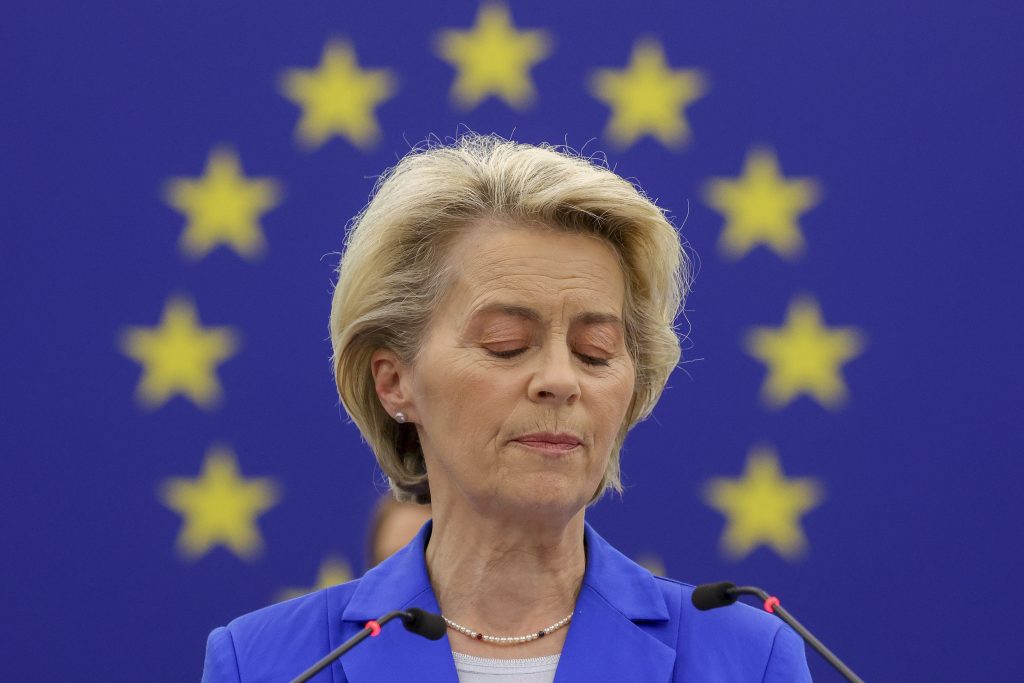
Until now, the re-election of EU Commission President Ursula von der Leyen was considered a formality: if the German CDU politician were to run for a second term of office – which almost everyone in Brussels assumes – she would easily get a majority in both the European Council and the European Parliament. But now MEPs object to this – they do not want to simply nod off the possible re-election.
It is “not a matter of course” that the top candidate system, which failed in the 2019 European elections, will work this time, said the former lead candidate of the Greens, Ska Keller, in an interview with Table.Media. The Council should also not assume that it has the “pretext” and that the Parliament will support a decision on the next Commission President as a matter of course.
“After the European elections, we need to be faster and find a majority for the next Commission President,” said Keller. “In my view, it is now important for the European Parliament to take the initiative and not leave everything to the Council.” This also includes the Parliament drawing up a coalition agreement. 2019 had shown that this would take time. We must thus be prepared for long negotiations.
Keller will no longer be there: she handed over the chairmanship of the Green parliamentary group to Terry Reintke and is no longer running for Parliament. But she is not alone in her warnings. Other parliamentary groups also call for more say, with some MPs even taking von der Leyen and her agency head-on.
The former leader of the Liberal Group, Belgian Guy Verhofstadt, is particularly vehement. “I’m calling on all MEPs to stand up against the von der Leyen Commission – if as happened last week, a new unblocking EU funds is repeated,” he wrote on X. “The rule of law is non-negotiable,” he added.
The background is the Commission’s decision to release around €10 billion from the EU budget for Hungary. All major parliamentary groups had protested against this in a letter. Contrary to what the Commission claims, the criteria for the independence of the judiciary are not met. Rather, the aim was apparently to appease Prime Minister Viktor Orbán shortly before the EU summit.
“Ursula von der Leyen is now paying the biggest bribe in the history of the EU – €10 billion – to the autocrat and Putin friend Viktor Orbán,” said Green MEP Daniel Freund. “Allowing Orbán to continue to blackmail us is not a successful strategy. The Member States and the EU Commission must finally recognize this,” said FDP MEP Moritz Körner.
The Social Democrats also criticise this. The EU has made itself vulnerable to blackmail, said the Vice-President of the European Parliament, Katarina Barley (SPD). “That was a mistake on the part of the Commission.” This mistake must not be repeated, according to the barely concealed warning from the Parliament. Otherwise, CDU politician von der Leyen would have to expect problems with her re-election.
However, these problems could also exist without Orbán. Last Tuesday, the Parliament passed a resolution in favor of a new regulation of the top candidate system, which in parts reads like a declaration of war on the Council.
MEPs are calling for the European parties and political groups to start negotiations on a joint candidate immediately after the election – and before the European Council makes a proposal. The day after the election is crucial.
To this end, they seek a binding agreement with the European Council. Furthermore, the Parliament is calling on the Council to swiftly adopt the new European electoral law and the new rules for European political parties and foundations so that the latter at least apply for the 2024 elections.
“The electorate needs clarity on how their vote will affect the EU’s personnel and policies,” said co-rapporteur Sven Simon (CDU). “Unlike in 2019, we must not make promises we cannot keep. The top candidate process must become credible again. Whoever is elected President of the new Commission needs a clear mandate from the electorate and a majority in Parliament.”
This also applies to von der Leyen. She can thus no longer rely solely on the approval of the European Council, as was the case in 2019, when the Council presented the Parliament with a fait accompli and nominated von der Leyen even though she had not even stood in the election. This should not happen again in 2024.
However, it is unclear whether the member states will agree to the MEPs’ demands. It also remains to be seen whether the anger in the Parliament over von der Leyen’s suspected “billion-euro deal” with Orbán will subside. If the German Commission President were to release even more funds for Hungary, things could get close.

The European Media Freedom Act has been negotiated. It was intended to be the EU’s response to the deaths of journalists such as Jan Kuciak in Slovakia and the Maltese blogger Daphne Caureanea Galizia. The EMFA was also supposed to counteract the influence of governments on the media, excessive media concentration and double regulation of self-regulated media providers on social media platforms – and also guarantee the protection of journalists from state spying.
One person was happy after the agreement: EU Commission Vice-President Věra Jourová. It was about regulating the space for media – not about regulating media, she said on Friday after the trilogue.
How well must, should or may journalists, relatives and sources be protected to guarantee media freedom effectively? What was negotiated quite consensually concerning the ban on state agencies exerting influence on the media almost led to a termination of the trilogue in other areas.
In particular, incidents involving spyware used by government agencies to monitor journalists and their sources in EU member states have fueled the debate over the past two years. However, France in particular did not want to be ruled here. Macron’s government had tried to tear huge holes in the level of protection via the Council – by writing far-reaching exceptions into the protection regulations in cases of overriding state interest.
The European Parliament had called for extensive protective measures here. The EMFA almost failed at precisely this point. Negotiations had to be interrupted several times on Friday to consult with the Élysée, according to participants in the trilogue.
In the end, however, the Parliament preferred to compromise rather than having no EMFA at all. Although journalistic sources and confidential communications are principally protected, the Parliament’s position provided for far-reaching protection of all journalistic activities.
Ramona Strugariu (Renew), co-negotiator for the LIBE Committee, confirmed after the conclusion of the negotiations that any measures against journalists would require prior judicial or independent approval. In the end, however, there is a clause: the competencies under the European treaties should “remain respected” – and thus measures in the context of national security would not be covered by the EMFA. According to rapporteur Sabine Verheyen (CDU), this clarifies that measures are only possible in absolutely exceptional cases.
However, from a parliamentary perspective, this can only remain unsatisfactory. It is good that no general exception for surveillance for national security has been included in the EMFA, says SPD MEP Petra Kammerevert. However: “The Parliament wanted a ban on surveillance measures if this could lead to access to journalistic sources or is even only related to work as a journalist.”
There are also some changes in other areas with the EMFA. From the perspective of the particularly large platform providers, subject to the moderation obligations of the Digital Services Act for user content, the focus was on Article 17. The key point of contention: whether Facebook, X (former Twitter), YouTube, TikTok and the like must treat the content of non-partisan and non-governmental media subject to independent control differently from that of other users when handling content under their terms and conditions.
The EMFA compromise affirms this in principle, albeit with little impact. Such media providers must first declare to the platforms that they meet the criteria and state which regulatory or self-regulatory institution they belong to or are subject to. In Germany, this would be the Press Council or the supervisory bodies of the state media authorities, which are organized independently of the state.
If a platform provider now wants to block or delete content from this media because it would violate general terms and conditions, the providers must give the reasons for this. This relates exclusively to breaches of terms and conditions, not suspected breaches of the law. Media providers are to be treated in the same way as other content creators. They should then respond within 24 hours, or even faster in crises.
But even this regulation goes too far for the IT association CCIA: “Those with bad intentions who pose as legitimate media companies will now have the opportunity to abuse this mechanism to distribute dangerous content for 24 hours before anything can be done about it,” criticizes the association. Rapporteur Sabine Verheyen (CDU) sees this as unfounded. The conditions are high: “The quality media can benefit from this regulation,” she said after the conclusion of the trilogue.
However, there are hardly any possibilities to enforce these rights using the EMFA: there are no direct sanctions for providers in the event of non-compliance – and outside the DSA obligations, the “must carry” regulations cannot be sanctioned either.
A small but potentially momentous change can be found in the agreement text regarding the customizability of user interfaces: The simple change to the configuration of “media services offering programs” is to apply here – i.e. any form of linear distribution that follows a fixed scheme. Originally, only audiovisual media services were envisaged here; the Parliament wanted to add audio services, but here, the Council also prevailed.
Finally, the provisions for public media providers in Article 5 have also become less strict. In Germany, this primarily affects public broadcasters. A rather tame wording has now been found for appointments to top positions, where German broadcasting politicians only have reason to fear little change.
However, the unified EMFA text also contains a provision on funding: this must be appropriate, sustainable and predictable, among other things, and correspond to the obligations and the opportunity for development. These resources must be structured in such a way that journalistic independence is protected.
Media ownership structures in the EU are to become much more transparent. A database is to play a big part here, in which information on ownership structures and responsible parties must be stored.
Innovations are also the regulations for state advertising – this was regularly used in some member states as a vehicle to promote pro-government reporting – and to punish criticism. Here, the EMFA introduces transparency and plurality obligations in Article 24 – both for state advertising in traditional media forms and for online platforms.
In many respects, Věra Jourová’s delight at the agreement cannot be explained by better protection for journalists and the media in all Member States. This is because the EMFA does not represent an effective improvement over the national framework in many Member States. However, it could force some changes in certain areas, particularly in those states with the most problematic situations – so far, these have mainly been Hungary, Poland and Slovakia.
In France, broadcasting financing must be reformed, in Austria, the state advertising system, Germany will examine the effects in each federal state. However, implementation depends largely on enforcement – so far a weakness of the EU Commission regarding media freedom.
The positions of the majority of Member States gave little hope for this. “At the end of the trilogue negotiations, there was not much left of the good parliamentary positions,” said SPD MEP Kammerevert, who is thus unconvinced by the result. “The Council got its way on all key points – partly because a majority of conservatives, liberals and greens often caved in too quickly to the Council.”
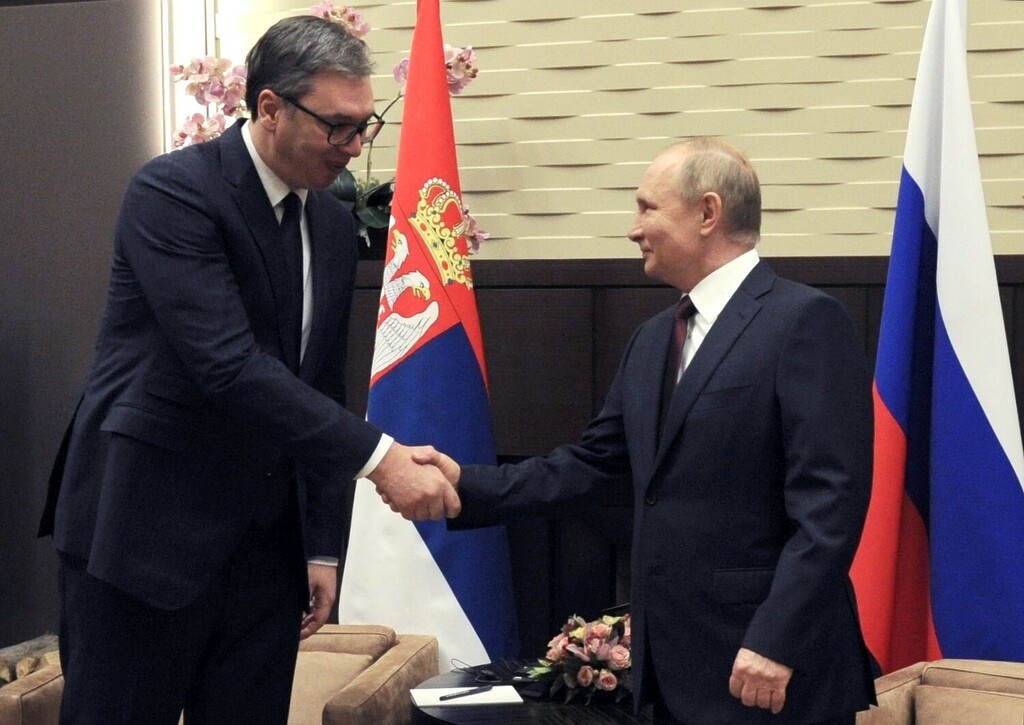
The ruling Serbian Progressive Party (SNS) of President Aleksandar Vučić is in the lead in Sunday’s early parliamentary elections with 46.6 percent of the vote. This is the result of a projection by the polling institutes Ipsos and CeSID yesterday evening, based on a partial count of a random sample of polling stations. The opposition alliance “Serbia against Violence” is expected to come second with 23 percent of the vote, while the Socialist Party of Serbia is seen in third place with 6.9 percent. rtr
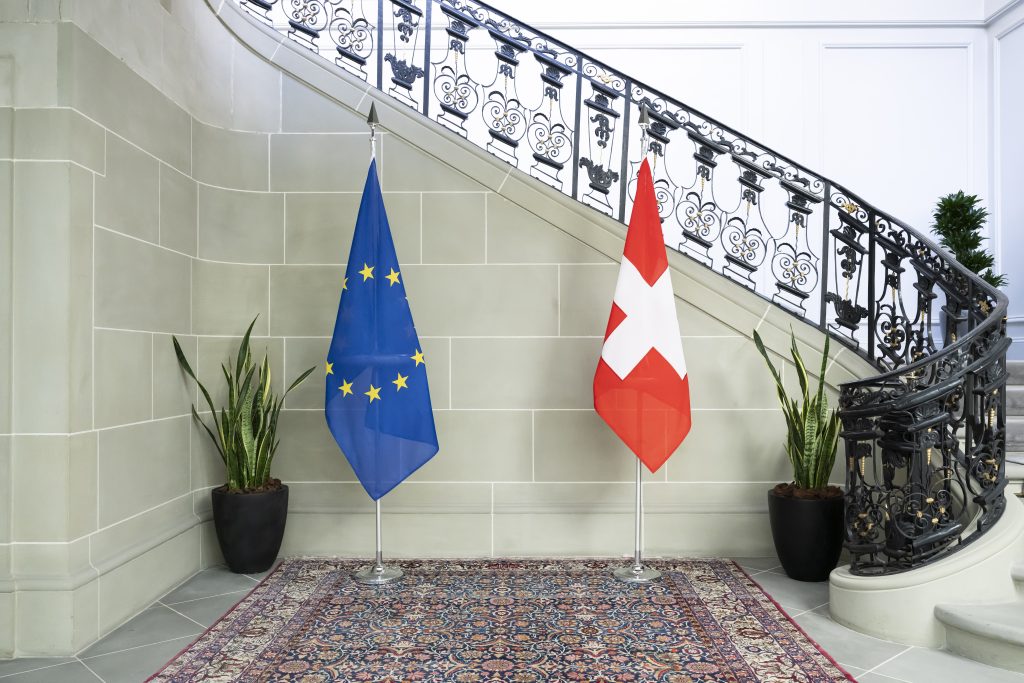
Switzerland and the EU want to conclude their negotiations on a new framework agreement by the end of 2024. Both sides published an agreement to this effect last Friday. “The conclusion of the exploratory talks is a first and important step towards placing the EU-Switzerland bilateral relationship on a better footing,” reads a letter from Commission President Ursula von der Leyen to the Swiss government.
In the agreement, both sides outline common ideas for several policy areas. Accordingly, the agreement on trade in agricultural products is to be developed into an “EU-Switzerland food safety area.” On the one hand, this step should facilitate trade, but also allow Switzerland to maintain its standards – for example in food production technologies.
Further facilitations concern research and education. According to the Commission, Switzerland is to be associated with several programs: Horizon, Euratom Research & Training, ITER, Digital Europe, Copernicus and Erasmus+. As soon as negotiations begin, Swiss institutions will also have the opportunity to apply for funding from the European Research Council (ERC).
The Swiss Federal Council decided on Friday to consult the Parliament and the cantons regarding a negotiating mandate. The EU Commission intends to submit negotiating guidelines to the Council of the EU in the next few days. ber
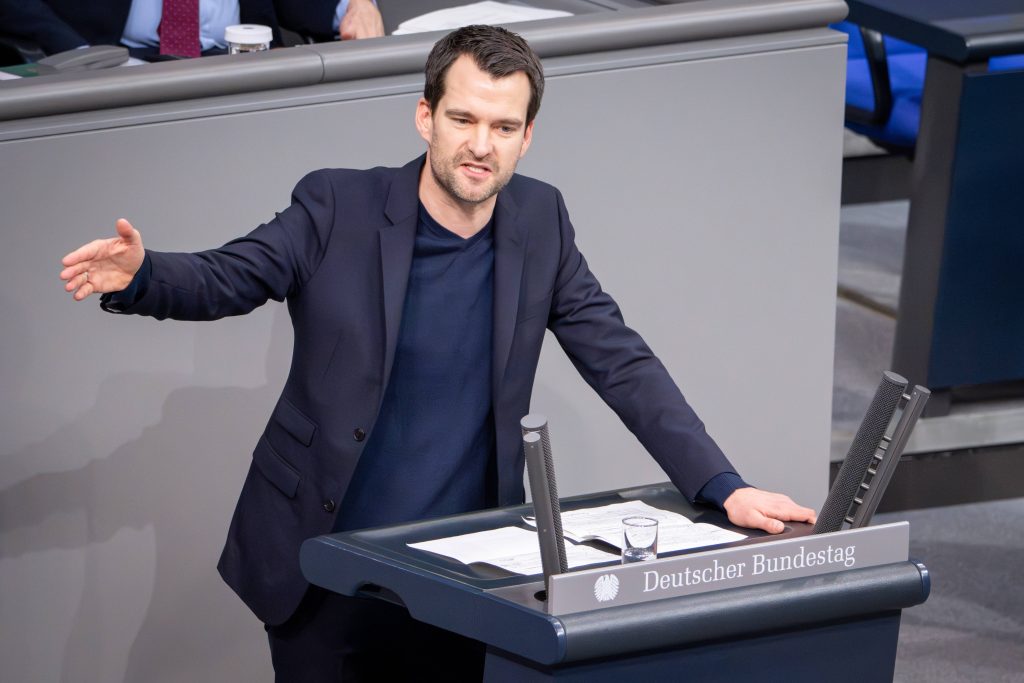
Following the trilogue agreements on the EU Due Diligence Directive (CSDDD) and the EU Platform Directive, the FDP has voiced clear criticism: in an interview with Table.Media, Federal Vice President Johannes Vogel described the results as “blows against Europe as a business location.” The Due Diligence Directive threatens to pull the lever in the wrong direction. The EU Commission must not create any additional bureaucracy and thus destroy the reduction in bureaucracy at the national level. “Ursula von der Leyen has spoken grandiosely about reducing bureaucracy, but she and her Commission must not create new red tape with the Supply Chain Act. That would be the wrong approach.”
The agreement on the EU Platform Directive, on the other hand, is an “attack on all self-employed people in Europe,” Vogel told Table.Media. Naturally, self-employed people should also be able to offer their services with the help of digital platforms. Digital platforms such as transport service providers should not be restricted by too many regulations, which would increase prices. Self-determined self-employed people should not be harassed. “The EU’s current plans are a huge step backward, which Germany will rightly not agree to at the instigation of the Free Democrats,” explained Vogel. The aim must be to prevent a majority for this directive altogether. Under pressure from the FDP, Germany had so far abstained from the negotiations. The EU Parliament and the member states still have to formally adopt the respective agreements. leo

Decision-makers in Germany expect the federal government to put special effort into digital policy in the second half of the legislative period – but at the same time, they hardly consider it to have sufficient expertise in this area. They have similarly high expectations of energy and climate policy. Here, however, they believe it has the greatest expertise and also expect implementation.
This is the result of an exclusive survey conducted by the digital media company Table.Media, in which over 3,000 high-ranking stakeholders took part. They are registered in the Transparency Register of the German Bundestag and the majority come from companies, associations and non-governmental organizations or science and administration. They are spread across sectors such as the automotive or energy sector, the construction or digital economy, as well as trade unions and environmental associations.
For almost 82 percent of respondents, special efforts by the German government in climate and energy policy are of rather high or even high importance. Around 85 percent also assume that there will be an actual focus on energy policy in the next two years. However, only just under 20 percent predict this for AI and data policy.
In general, decision-makers tend to give the German government mediocre marks. However, the traffic light coalition achieved the best score in terms of competence in climate and energy policy. Here, around 37 percent of respondents gave it a high or rather high level of competence in finding solutions. Regarding digital expansion, the figure is just 7.4 percent overall. Only 0.6 percent see it as highly competent.
In concrete terms, this assessment is also reflected in praise for the work of the Federal Minister for Economic Affairs and Climate, Robert Habeck, as well as clear criticism of the Federal Minister for Transport and Digital Infrastructure, Volker Wissing. Despite the debate on the Heating Act and the so-called best man affair involving his former State Secretary Patrick Graichen, the Green politician exceeded or rather exceeded the expectations of around 42 percent of respondents regarding his performance in the first half of the legislative period.
This puts him in fourth place among the ministers. The FDP politician received the worst rating: more than 69 percent found his performance in the first two years disappointing or rather disappointing. Foreign Minister Annalena Baerbock (Greens) tops the list when asked which federal ministries stand out for their particularly high level of professionalism in their work.
Respondents believe that the opposition in Germany is currently less well positioned in terms of personnel: Only just under 13 percent think it is realistic that the CDU/CSU will be part of the next federal government with CDU chairman Friedrich Merz.
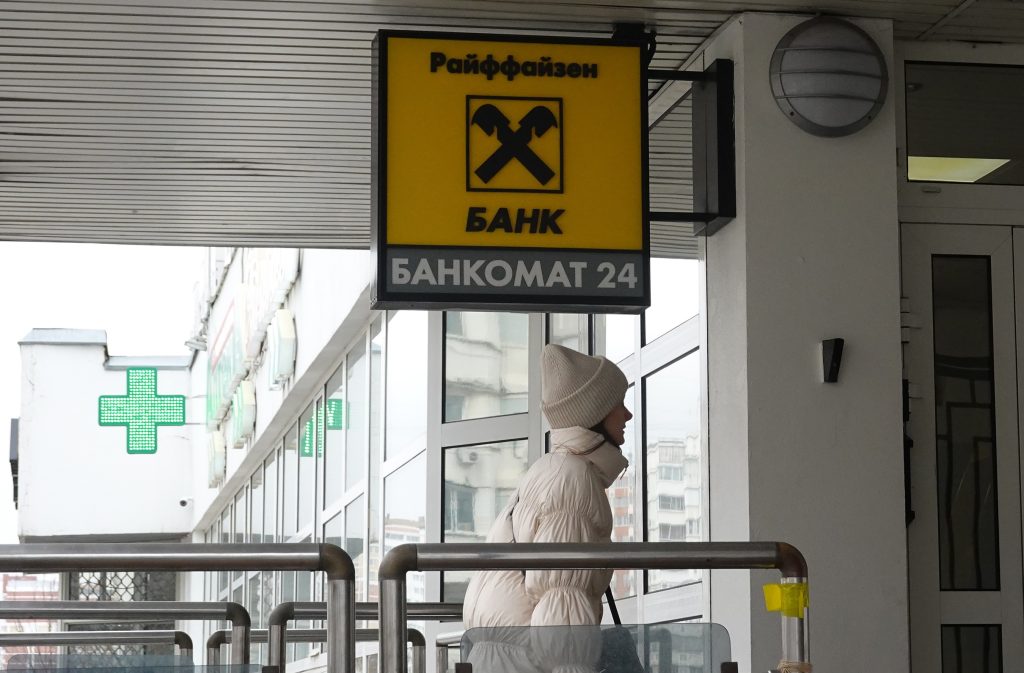
Austria is giving up its blockade of the twelfth EU sanctions package against Russia. According to the website of the government in Kyiv and an EU diplomat, Ukraine had previously removed the Austrian Raiffeisen Bank International from a blacklist. Austria had pushed for the bank to be removed from the Ukrainian list of “international sponsors of the war.” The list aims to put pressure on companies that do business in Russia and support the war effort, for example by paying taxes. rtr
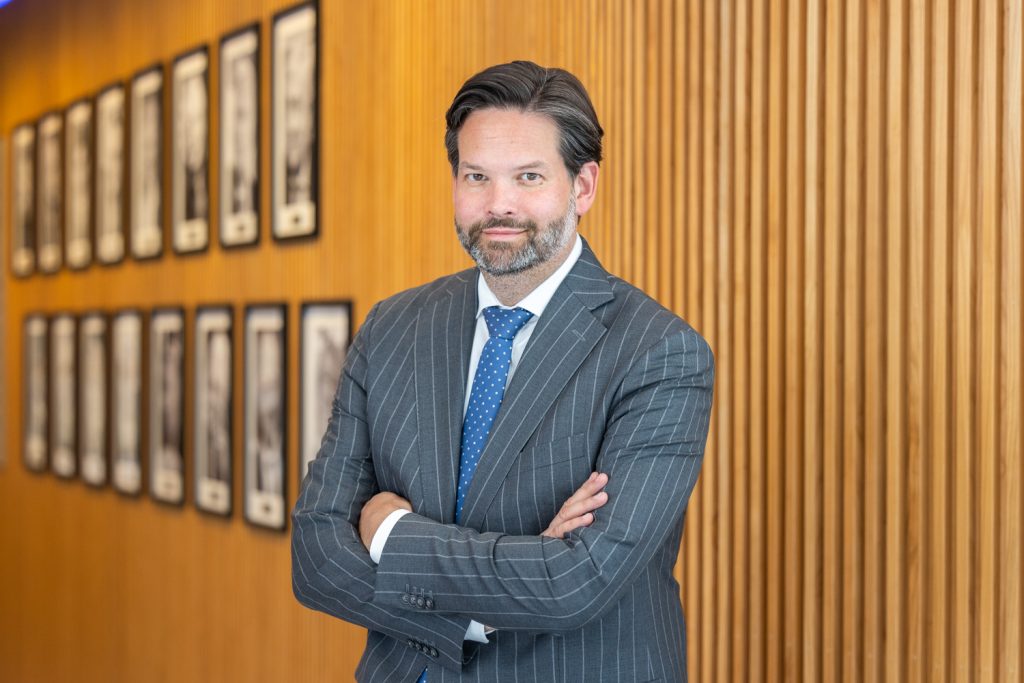
Patience is not one of Lukas Mandl’s strengths of character, as he says himself – but his perseverance has been rewarded these days. The 44-year-old Austrian has been a Member of the European Parliament for the EPP since 2017. He has primarily come into the limelight in recent months as its chief negotiator with Switzerland. The talks aim to work out a so-called package solution, i.e. a framework agreement with the Swiss.
“To put it positively: I’m a friend of speed,” says Mandl with a smile. Because he also knows: the struggle between the EU Commission and the Swiss Federal Council to agree on issues such as the free movement of workers, joint security policy efforts and research initiatives has often been tough in the past. Negotiations have been ongoing since 2014, and an end has been in sight since last week.
On Friday, the Commission and Federal Council published an agreement on the further negotiations of the framework agreement. They are now to be concluded by 2024.
Mandl has been the Parliament’s rapporteur on Switzerland since mid-2021. It was clear to him that he wanted to take on this role when Jean-Claude Juncker stepped down as Commission President in 2019. When he said at the end of his term of office that the lack of a framework agreement between the EU and Switzerland was one of his few failings, Mandl made his decision. “At that moment, I knew I wanted to do it,” he says.
In conversation, Mandl points out how important it is to find a forward-looking agreement with Switzerland as a “model European country.” There has always been a “natural affinity between the two sides like with no other part of the world,” says Mandl. For this reason, the mutual importance of the two negotiating partners “must be number one.” For Switzerland, this applies in particular to the economic level, for the EU, especially from a security policy perspective.
However, he does not see himself as a mediator between the EU and the Swiss in the talks. “I don’t stand in the middle between the two, but clearly on the side of the EU.” Nevertheless, he praises the cooperation with the Swiss officials around the head of the Department of Foreign Affairs, Ignazio Cassis, as “wonderful because it is always constructive and appreciative.”
After Mandl presented the Swiss report on behalf of the European Parliament in October, he has largely taken himself off the hook for the way forward for the framework agreement. “It is now clearly an executive matter for the Commission and the Federal Council to bring the negotiations to a conclusion,” he says.
For his own future, Mandl is looking ahead to the time after the European elections in 2024. As the parliamentary representative responsible for “security in the broad sense,” he has already been working on conflicts such as in Israel or the Western Balkans in recent months. As a parliamentarian, he would like to focus more on other geopolitical regions central to the EU. These include Africa and Latin America in particular. At the heart of this is his European policy motto: more security on the outside, more freedom on the inside. Jasper Bennink
Today, climate researcher Ottmar Edenhofer is facing the perhaps most important lunch of his career. At the Environment Council in Brussels, the Director of the Potsdam Institute for Climate Impact Research is to advise the ministers on the EU climate target for 2040. Edenhofer, who also chairs the European Scientific Advisory Board on Climate Change, could cause some politicians to take offense.
Edenhofer’s experts recommend a 90 to 95 percent reduction in emissions if the EU wants to remain on the path of the Paris Agreement. At his hearings in the EU Parliament, Climate Commissioner Hauke Hoekstra only committed to a target of “at least 90 percent.” However, scientists emphasize that up to 95 percent is not only necessary but also feasible.
The other ingredients on the daily menu in Brussels are empty calories compared to this. A debate on the Soil Monitoring Directive, even the general approach to the Packaging Ordinance: both laws are unlikely to be passed in this legislative period.
But the all the more substantial Christmas dinner is already waiting. With this in mind, have a good start to what for many will be the last work week of the year!


Until now, the re-election of EU Commission President Ursula von der Leyen was considered a formality: if the German CDU politician were to run for a second term of office – which almost everyone in Brussels assumes – she would easily get a majority in both the European Council and the European Parliament. But now MEPs object to this – they do not want to simply nod off the possible re-election.
It is “not a matter of course” that the top candidate system, which failed in the 2019 European elections, will work this time, said the former lead candidate of the Greens, Ska Keller, in an interview with Table.Media. The Council should also not assume that it has the “pretext” and that the Parliament will support a decision on the next Commission President as a matter of course.
“After the European elections, we need to be faster and find a majority for the next Commission President,” said Keller. “In my view, it is now important for the European Parliament to take the initiative and not leave everything to the Council.” This also includes the Parliament drawing up a coalition agreement. 2019 had shown that this would take time. We must thus be prepared for long negotiations.
Keller will no longer be there: she handed over the chairmanship of the Green parliamentary group to Terry Reintke and is no longer running for Parliament. But she is not alone in her warnings. Other parliamentary groups also call for more say, with some MPs even taking von der Leyen and her agency head-on.
The former leader of the Liberal Group, Belgian Guy Verhofstadt, is particularly vehement. “I’m calling on all MEPs to stand up against the von der Leyen Commission – if as happened last week, a new unblocking EU funds is repeated,” he wrote on X. “The rule of law is non-negotiable,” he added.
The background is the Commission’s decision to release around €10 billion from the EU budget for Hungary. All major parliamentary groups had protested against this in a letter. Contrary to what the Commission claims, the criteria for the independence of the judiciary are not met. Rather, the aim was apparently to appease Prime Minister Viktor Orbán shortly before the EU summit.
“Ursula von der Leyen is now paying the biggest bribe in the history of the EU – €10 billion – to the autocrat and Putin friend Viktor Orbán,” said Green MEP Daniel Freund. “Allowing Orbán to continue to blackmail us is not a successful strategy. The Member States and the EU Commission must finally recognize this,” said FDP MEP Moritz Körner.
The Social Democrats also criticise this. The EU has made itself vulnerable to blackmail, said the Vice-President of the European Parliament, Katarina Barley (SPD). “That was a mistake on the part of the Commission.” This mistake must not be repeated, according to the barely concealed warning from the Parliament. Otherwise, CDU politician von der Leyen would have to expect problems with her re-election.
However, these problems could also exist without Orbán. Last Tuesday, the Parliament passed a resolution in favor of a new regulation of the top candidate system, which in parts reads like a declaration of war on the Council.
MEPs are calling for the European parties and political groups to start negotiations on a joint candidate immediately after the election – and before the European Council makes a proposal. The day after the election is crucial.
To this end, they seek a binding agreement with the European Council. Furthermore, the Parliament is calling on the Council to swiftly adopt the new European electoral law and the new rules for European political parties and foundations so that the latter at least apply for the 2024 elections.
“The electorate needs clarity on how their vote will affect the EU’s personnel and policies,” said co-rapporteur Sven Simon (CDU). “Unlike in 2019, we must not make promises we cannot keep. The top candidate process must become credible again. Whoever is elected President of the new Commission needs a clear mandate from the electorate and a majority in Parliament.”
This also applies to von der Leyen. She can thus no longer rely solely on the approval of the European Council, as was the case in 2019, when the Council presented the Parliament with a fait accompli and nominated von der Leyen even though she had not even stood in the election. This should not happen again in 2024.
However, it is unclear whether the member states will agree to the MEPs’ demands. It also remains to be seen whether the anger in the Parliament over von der Leyen’s suspected “billion-euro deal” with Orbán will subside. If the German Commission President were to release even more funds for Hungary, things could get close.

The European Media Freedom Act has been negotiated. It was intended to be the EU’s response to the deaths of journalists such as Jan Kuciak in Slovakia and the Maltese blogger Daphne Caureanea Galizia. The EMFA was also supposed to counteract the influence of governments on the media, excessive media concentration and double regulation of self-regulated media providers on social media platforms – and also guarantee the protection of journalists from state spying.
One person was happy after the agreement: EU Commission Vice-President Věra Jourová. It was about regulating the space for media – not about regulating media, she said on Friday after the trilogue.
How well must, should or may journalists, relatives and sources be protected to guarantee media freedom effectively? What was negotiated quite consensually concerning the ban on state agencies exerting influence on the media almost led to a termination of the trilogue in other areas.
In particular, incidents involving spyware used by government agencies to monitor journalists and their sources in EU member states have fueled the debate over the past two years. However, France in particular did not want to be ruled here. Macron’s government had tried to tear huge holes in the level of protection via the Council – by writing far-reaching exceptions into the protection regulations in cases of overriding state interest.
The European Parliament had called for extensive protective measures here. The EMFA almost failed at precisely this point. Negotiations had to be interrupted several times on Friday to consult with the Élysée, according to participants in the trilogue.
In the end, however, the Parliament preferred to compromise rather than having no EMFA at all. Although journalistic sources and confidential communications are principally protected, the Parliament’s position provided for far-reaching protection of all journalistic activities.
Ramona Strugariu (Renew), co-negotiator for the LIBE Committee, confirmed after the conclusion of the negotiations that any measures against journalists would require prior judicial or independent approval. In the end, however, there is a clause: the competencies under the European treaties should “remain respected” – and thus measures in the context of national security would not be covered by the EMFA. According to rapporteur Sabine Verheyen (CDU), this clarifies that measures are only possible in absolutely exceptional cases.
However, from a parliamentary perspective, this can only remain unsatisfactory. It is good that no general exception for surveillance for national security has been included in the EMFA, says SPD MEP Petra Kammerevert. However: “The Parliament wanted a ban on surveillance measures if this could lead to access to journalistic sources or is even only related to work as a journalist.”
There are also some changes in other areas with the EMFA. From the perspective of the particularly large platform providers, subject to the moderation obligations of the Digital Services Act for user content, the focus was on Article 17. The key point of contention: whether Facebook, X (former Twitter), YouTube, TikTok and the like must treat the content of non-partisan and non-governmental media subject to independent control differently from that of other users when handling content under their terms and conditions.
The EMFA compromise affirms this in principle, albeit with little impact. Such media providers must first declare to the platforms that they meet the criteria and state which regulatory or self-regulatory institution they belong to or are subject to. In Germany, this would be the Press Council or the supervisory bodies of the state media authorities, which are organized independently of the state.
If a platform provider now wants to block or delete content from this media because it would violate general terms and conditions, the providers must give the reasons for this. This relates exclusively to breaches of terms and conditions, not suspected breaches of the law. Media providers are to be treated in the same way as other content creators. They should then respond within 24 hours, or even faster in crises.
But even this regulation goes too far for the IT association CCIA: “Those with bad intentions who pose as legitimate media companies will now have the opportunity to abuse this mechanism to distribute dangerous content for 24 hours before anything can be done about it,” criticizes the association. Rapporteur Sabine Verheyen (CDU) sees this as unfounded. The conditions are high: “The quality media can benefit from this regulation,” she said after the conclusion of the trilogue.
However, there are hardly any possibilities to enforce these rights using the EMFA: there are no direct sanctions for providers in the event of non-compliance – and outside the DSA obligations, the “must carry” regulations cannot be sanctioned either.
A small but potentially momentous change can be found in the agreement text regarding the customizability of user interfaces: The simple change to the configuration of “media services offering programs” is to apply here – i.e. any form of linear distribution that follows a fixed scheme. Originally, only audiovisual media services were envisaged here; the Parliament wanted to add audio services, but here, the Council also prevailed.
Finally, the provisions for public media providers in Article 5 have also become less strict. In Germany, this primarily affects public broadcasters. A rather tame wording has now been found for appointments to top positions, where German broadcasting politicians only have reason to fear little change.
However, the unified EMFA text also contains a provision on funding: this must be appropriate, sustainable and predictable, among other things, and correspond to the obligations and the opportunity for development. These resources must be structured in such a way that journalistic independence is protected.
Media ownership structures in the EU are to become much more transparent. A database is to play a big part here, in which information on ownership structures and responsible parties must be stored.
Innovations are also the regulations for state advertising – this was regularly used in some member states as a vehicle to promote pro-government reporting – and to punish criticism. Here, the EMFA introduces transparency and plurality obligations in Article 24 – both for state advertising in traditional media forms and for online platforms.
In many respects, Věra Jourová’s delight at the agreement cannot be explained by better protection for journalists and the media in all Member States. This is because the EMFA does not represent an effective improvement over the national framework in many Member States. However, it could force some changes in certain areas, particularly in those states with the most problematic situations – so far, these have mainly been Hungary, Poland and Slovakia.
In France, broadcasting financing must be reformed, in Austria, the state advertising system, Germany will examine the effects in each federal state. However, implementation depends largely on enforcement – so far a weakness of the EU Commission regarding media freedom.
The positions of the majority of Member States gave little hope for this. “At the end of the trilogue negotiations, there was not much left of the good parliamentary positions,” said SPD MEP Kammerevert, who is thus unconvinced by the result. “The Council got its way on all key points – partly because a majority of conservatives, liberals and greens often caved in too quickly to the Council.”

The ruling Serbian Progressive Party (SNS) of President Aleksandar Vučić is in the lead in Sunday’s early parliamentary elections with 46.6 percent of the vote. This is the result of a projection by the polling institutes Ipsos and CeSID yesterday evening, based on a partial count of a random sample of polling stations. The opposition alliance “Serbia against Violence” is expected to come second with 23 percent of the vote, while the Socialist Party of Serbia is seen in third place with 6.9 percent. rtr

Switzerland and the EU want to conclude their negotiations on a new framework agreement by the end of 2024. Both sides published an agreement to this effect last Friday. “The conclusion of the exploratory talks is a first and important step towards placing the EU-Switzerland bilateral relationship on a better footing,” reads a letter from Commission President Ursula von der Leyen to the Swiss government.
In the agreement, both sides outline common ideas for several policy areas. Accordingly, the agreement on trade in agricultural products is to be developed into an “EU-Switzerland food safety area.” On the one hand, this step should facilitate trade, but also allow Switzerland to maintain its standards – for example in food production technologies.
Further facilitations concern research and education. According to the Commission, Switzerland is to be associated with several programs: Horizon, Euratom Research & Training, ITER, Digital Europe, Copernicus and Erasmus+. As soon as negotiations begin, Swiss institutions will also have the opportunity to apply for funding from the European Research Council (ERC).
The Swiss Federal Council decided on Friday to consult the Parliament and the cantons regarding a negotiating mandate. The EU Commission intends to submit negotiating guidelines to the Council of the EU in the next few days. ber

Following the trilogue agreements on the EU Due Diligence Directive (CSDDD) and the EU Platform Directive, the FDP has voiced clear criticism: in an interview with Table.Media, Federal Vice President Johannes Vogel described the results as “blows against Europe as a business location.” The Due Diligence Directive threatens to pull the lever in the wrong direction. The EU Commission must not create any additional bureaucracy and thus destroy the reduction in bureaucracy at the national level. “Ursula von der Leyen has spoken grandiosely about reducing bureaucracy, but she and her Commission must not create new red tape with the Supply Chain Act. That would be the wrong approach.”
The agreement on the EU Platform Directive, on the other hand, is an “attack on all self-employed people in Europe,” Vogel told Table.Media. Naturally, self-employed people should also be able to offer their services with the help of digital platforms. Digital platforms such as transport service providers should not be restricted by too many regulations, which would increase prices. Self-determined self-employed people should not be harassed. “The EU’s current plans are a huge step backward, which Germany will rightly not agree to at the instigation of the Free Democrats,” explained Vogel. The aim must be to prevent a majority for this directive altogether. Under pressure from the FDP, Germany had so far abstained from the negotiations. The EU Parliament and the member states still have to formally adopt the respective agreements. leo

Decision-makers in Germany expect the federal government to put special effort into digital policy in the second half of the legislative period – but at the same time, they hardly consider it to have sufficient expertise in this area. They have similarly high expectations of energy and climate policy. Here, however, they believe it has the greatest expertise and also expect implementation.
This is the result of an exclusive survey conducted by the digital media company Table.Media, in which over 3,000 high-ranking stakeholders took part. They are registered in the Transparency Register of the German Bundestag and the majority come from companies, associations and non-governmental organizations or science and administration. They are spread across sectors such as the automotive or energy sector, the construction or digital economy, as well as trade unions and environmental associations.
For almost 82 percent of respondents, special efforts by the German government in climate and energy policy are of rather high or even high importance. Around 85 percent also assume that there will be an actual focus on energy policy in the next two years. However, only just under 20 percent predict this for AI and data policy.
In general, decision-makers tend to give the German government mediocre marks. However, the traffic light coalition achieved the best score in terms of competence in climate and energy policy. Here, around 37 percent of respondents gave it a high or rather high level of competence in finding solutions. Regarding digital expansion, the figure is just 7.4 percent overall. Only 0.6 percent see it as highly competent.
In concrete terms, this assessment is also reflected in praise for the work of the Federal Minister for Economic Affairs and Climate, Robert Habeck, as well as clear criticism of the Federal Minister for Transport and Digital Infrastructure, Volker Wissing. Despite the debate on the Heating Act and the so-called best man affair involving his former State Secretary Patrick Graichen, the Green politician exceeded or rather exceeded the expectations of around 42 percent of respondents regarding his performance in the first half of the legislative period.
This puts him in fourth place among the ministers. The FDP politician received the worst rating: more than 69 percent found his performance in the first two years disappointing or rather disappointing. Foreign Minister Annalena Baerbock (Greens) tops the list when asked which federal ministries stand out for their particularly high level of professionalism in their work.
Respondents believe that the opposition in Germany is currently less well positioned in terms of personnel: Only just under 13 percent think it is realistic that the CDU/CSU will be part of the next federal government with CDU chairman Friedrich Merz.

Austria is giving up its blockade of the twelfth EU sanctions package against Russia. According to the website of the government in Kyiv and an EU diplomat, Ukraine had previously removed the Austrian Raiffeisen Bank International from a blacklist. Austria had pushed for the bank to be removed from the Ukrainian list of “international sponsors of the war.” The list aims to put pressure on companies that do business in Russia and support the war effort, for example by paying taxes. rtr

Patience is not one of Lukas Mandl’s strengths of character, as he says himself – but his perseverance has been rewarded these days. The 44-year-old Austrian has been a Member of the European Parliament for the EPP since 2017. He has primarily come into the limelight in recent months as its chief negotiator with Switzerland. The talks aim to work out a so-called package solution, i.e. a framework agreement with the Swiss.
“To put it positively: I’m a friend of speed,” says Mandl with a smile. Because he also knows: the struggle between the EU Commission and the Swiss Federal Council to agree on issues such as the free movement of workers, joint security policy efforts and research initiatives has often been tough in the past. Negotiations have been ongoing since 2014, and an end has been in sight since last week.
On Friday, the Commission and Federal Council published an agreement on the further negotiations of the framework agreement. They are now to be concluded by 2024.
Mandl has been the Parliament’s rapporteur on Switzerland since mid-2021. It was clear to him that he wanted to take on this role when Jean-Claude Juncker stepped down as Commission President in 2019. When he said at the end of his term of office that the lack of a framework agreement between the EU and Switzerland was one of his few failings, Mandl made his decision. “At that moment, I knew I wanted to do it,” he says.
In conversation, Mandl points out how important it is to find a forward-looking agreement with Switzerland as a “model European country.” There has always been a “natural affinity between the two sides like with no other part of the world,” says Mandl. For this reason, the mutual importance of the two negotiating partners “must be number one.” For Switzerland, this applies in particular to the economic level, for the EU, especially from a security policy perspective.
However, he does not see himself as a mediator between the EU and the Swiss in the talks. “I don’t stand in the middle between the two, but clearly on the side of the EU.” Nevertheless, he praises the cooperation with the Swiss officials around the head of the Department of Foreign Affairs, Ignazio Cassis, as “wonderful because it is always constructive and appreciative.”
After Mandl presented the Swiss report on behalf of the European Parliament in October, he has largely taken himself off the hook for the way forward for the framework agreement. “It is now clearly an executive matter for the Commission and the Federal Council to bring the negotiations to a conclusion,” he says.
For his own future, Mandl is looking ahead to the time after the European elections in 2024. As the parliamentary representative responsible for “security in the broad sense,” he has already been working on conflicts such as in Israel or the Western Balkans in recent months. As a parliamentarian, he would like to focus more on other geopolitical regions central to the EU. These include Africa and Latin America in particular. At the heart of this is his European policy motto: more security on the outside, more freedom on the inside. Jasper Bennink
